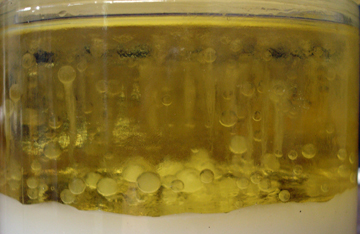New process turns chicken fat into biodiesel
New process turns chicken fat into biodiesel
mongabay.com
December 20, 2007
Chemical engineers at the University of Arkansas have devised a way to convert chicken fat into biodiesel fuel. The process advances efforts to “develop commercially viable fuel out of plentiful, accessible and low-cost feedstocks and other agricultural by-products,” according to the researchers.
“Major oil companies are already examining biodiesel as an alternative to petroleum,” said R.E. “Buddy” Babcock, professor of chemical engineering. “With the current price of petroleum diesel and the results of this project and others, I think energy producers will think even more seriously about combining petroleum-based diesel with a biodiesel product made out of crude and inexpensive feedstocks.”
Babcock says the yield from the process — termed supercritical methanol treatment — is greater than 90 percent.
“Supercritical methanol treatment dissolves and causes a reaction between components of a product — in this case, chicken fat and tall oil — by subjecting the product to high temperature and pressure,” explained a statement from the University of Arkansas. “Substances become “supercritical” when they are heated and pressurized to a critical point, the highest temperature and pressure at which the substance can exist in equilibrium as a vapor and liquid. The simple, one-step process does not require a catalyst.
 University of Arkansas graduate student Brent Schulte worked with this batch of tall oil fatty acid. |
“The supercritical method hit the free fatty-acid problem head on,” Babcock said. “Because it dissolves the feed material and eliminates the need for the base catalyst, we now do not have the problems with soap formation and loss of yield. The supercritical method actually prefers free fatty acid feedstocks.”
The development offers an alternative to biodiesel developed from refined vegetable oils, such as soybean, rapeseed, and palm oil, which are expensive and increasingly blamed for environmental problems. Babcock says that the high costs of vegetable feedstocks mean that biodiesel cannot compete with petroleum diesel unless the per-gallon price of diesel remains higher than $3. Using less refined and less-expensive feedstocks can make biodiesel more competitive with conventional diesel, but with fewer greenhouse gas emissions.
“Biodiesel provides an effective, sustainable-use fuel with many desirable properties,” said University of Arkansas graduate student Brent Schulte. “In addition to being a renewable, biodegradable and carbon-neutral fuel source, it can be formed in a matter of months from feedstocks produced locally, which promotes a more sustainable energy infrastructure. It also decreases dependence on foreign oil and creates new labor and market opportunities for domestic crops.”














